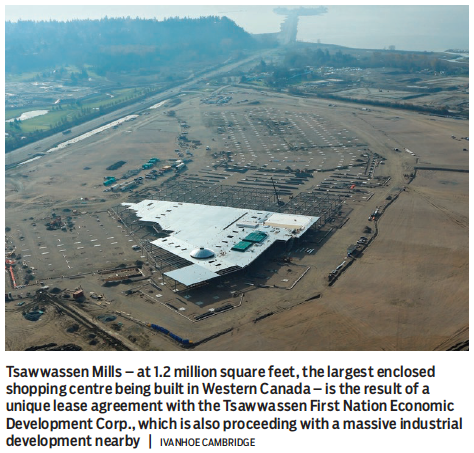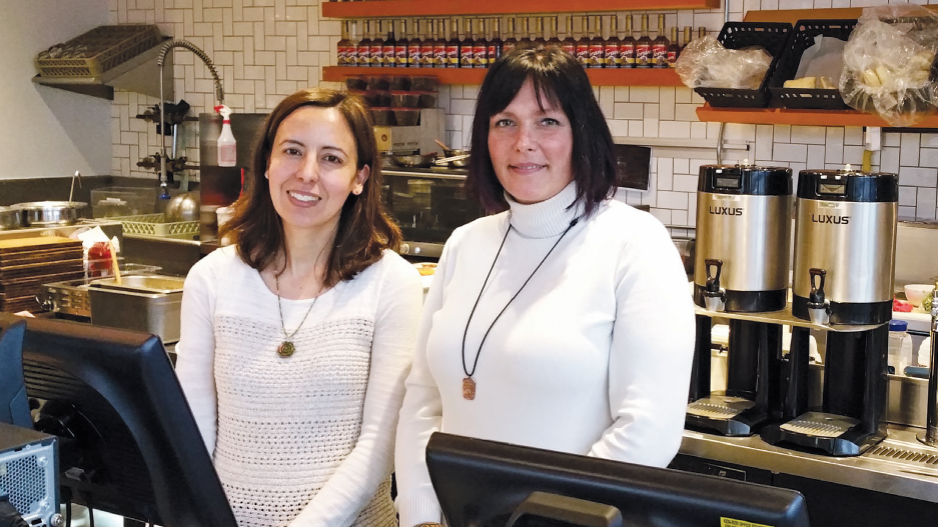It's approaching noon, and a lunchtime crowd has Lelem’ Arts and Cultural Café buzzing. Even among the funky aggregation of cafés, restaurants and retail shops that make Fort Langley one of the most distinctive communities in British Columbia, Lelem’ stands out. It boasts an organic West Coast fusion menu, jazz nights and, on the walls, paintings, carvings and other artwork celebrating the heritage of the café’s owners – the Kwantlen First Nation.
Brenda Fernie and Tumia Knott arrive together, shake the rain from their overcoats, sit down and present business cards to a first-time customer at Lelem’. Fernie, a former operations director for Coast Mountain Bus Co., is director of operations for Seyem’ Qwantlen Business Group, a for-profit enterprise of the 250-member Kwantlen First Nation. Knott, who has a law degree, is president, as well as a 20-year band councillor.
These women are part of a new generation of First Nations entrepreneurs who are moving their communities into the economic mainstream. In the resource sector, the Supreme Court of Canada’s recognition of aboriginal title in the Tsilhqot’in decision has created an uncertain climate for investment in activities such as forestry and mineral exploration. But for communities such as Kwantlen that are seeking partners for economic development, the mood is upbeat.
Lelem’ operates in a building owned by the Township of Langley, which selected Seyem’ Qwantlen’s innovative proposal from a range of suggestions from businesses and community groups for best use of the property.
The lease includes sharing a portion of the café with Langley Township for 1,000 hours per year of recreation programming, Fernie explained. “It’s an opportunity for people to learn about our culture. I don’t think it could have turned out any better.”
Knott said the partnership with the township reflects Kwantlen’s willingness, dating back to the establishment of Fort Langley as B.C.’s first mainland colony, to form mutually beneficial business relationships.
“If you look at many of our past chiefs, there always seems to have been a relationship that was broader than the reserve. The legacy has been passed down,” Knott said. Last year, Seyem’ Qwantlen was recognized with business awards from the Industry Council for Aboriginal Business and the BC Economic Development Association. Closer to home, the Greater Langley Chamber of Commerce shortlisted it for Entrepreneur of the Year.
Seyem’ Qwantlen also operates a gift shop in the Fort Langley National Historic Site as well as companies for forestry, construction, environmental services and archeology, an IT company called Coast Salish Technologies, security services and site and building rentals.
Land development is also a priority, such as a proposal for residential, commercial and light industrial development on Kwantlen reserve property in Maple Ridge.

There’s potential for conflict where aboriginal property development clashes with local growth targets and infrastructure spending. To avoid that, Seyem’ Qwantlen recently played host to a regional summit involving Kwantlen band council and local government members from Pitt Meadows, Maple Ridge and Mission.
“It’s important to keep the dialogue open and find synergies in planning,” Fernie said. “What benefits us should also benefit Maple Ridge. We’re going to be dependent on them for services so it only makes sense that we nurture that relationship. Nobody wants to live beside a neighbour that they’re not getting along with.”
Land is also central in economic development projects involving other First Nations around the province.
Through the federal government, the Squamish, Musqueam and Tsleil-Waututh First Nations in 2014 created a partnership for a $307 million land acquisition deal that will lead to development of Metro Vancouver properties including the Jericho Lands in Point Grey.
The Osoyoos Indian Band, one of Canada’s leaders in aboriginal entrepreneurship, recently signed a 120-year lease with the South Okanagan Motorsports Corp. for Area 27, a multi-purpose “motorsports country club” on 277 acres of Osoyoos band property.
Two retail megamalls are already under construction on Tsawwassen First Nation property in South Delta, and the First Nation’s TFN Economic Development Corp. recently announced development deals creating 1.5 million square feet of warehousing space on an 80-acre parcel of its industrial land reserve, close to Deltaport container port. That makes the Tsawwassen a cornerstone in efforts to expand the Pacific Gateway trade corridor in the years and decades ahead.
“Essentially we are Mile Zero for the rest of Canada in terms of logistics and distribution,” said Chris Hartman, TFN Economic Development Corp. CEO. “From a transportation and infrastructure perspective, our lands are probably as best-served as any parcel in the Lower Mainland.” •




